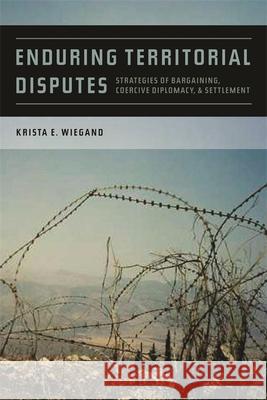Enduring Territorial Disputes: Strategies of Bargaining, Coercive Diplomacy, and Settlement » książka
Enduring Territorial Disputes: Strategies of Bargaining, Coercive Diplomacy, and Settlement
ISBN-13: 9780820337388 / Angielski / Twarda / 2011 / 376 str.
Of all the issues in international relations, disputes over territory are the most salient and most likely to lead to armed conflict. Understanding their endurance is of paramount importance. Although many states have settled their disagreements over territory, seventy-one disputes involving nearly 40 percent of all sovereign states remain unresolved.In this study, Krista E. Wiegand examines why some states are willing and able to settle territorial disputes while others are not. She argues that states may purposely maintain disputes over territory in order to use them as bargaining leverage in negotiations over other important unresolved issues. This dual strategy of issue linkage and coercive diplomacy allows the chal-lenger state to benefit from its territorial claim. Under such conditions, it has strong incentive to pursue diplomatic and militarized threats and very little incentive to settle the dispute over territory.Wiegand tests her theory in four case studies, three representing the major types of territorial disputes: uninhabited islands and territorial waters, as seen in tensions between China and Japan over the Senkaku and Diaoyu Islands; inhabited tracts of territory, such as the North African enclaves of Ceuta and Melilla affecting Morocco and Spain; and border areas, like the Shebaa Farms dispute between Lebanon and Israel. A fourth case study of a dispute between China and Russia represents a combination of all three types; settled in 2008, it serves as a negative example. All these disputes involve areas that have key strategic and economic importance both region-ally and globally.











